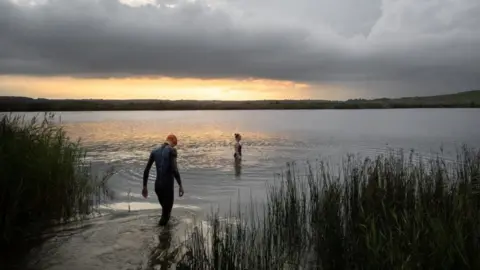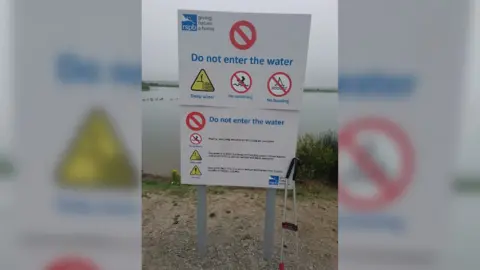St Aidan's: Outdoor swimmers banned from lake by RSPB
 Lance Sagar
Lance SagarOutdoor swimmers say they have been left "heartbroken" by a decision to ban entering the water at a nature park.
Signs have recently been placed by the RSPB at its St Aidan's site in Leeds prohibiting swimming in the lakes.
Swimmer Lance Sagar described the transformed open-cast mine as an "oasis" which had now been taken away from the community.
The RSPB said it put the signs up after a "significant increase" in the number of inexperienced swimmers at the site.
Swimmer Caroline Smithson, 57, from nearby Kippax, said she had used the lakes since before the RSPB reserve opened and was surprised when she saw the latest signs.
She said: "I swim in the way some people will walk around a beautiful site. I swim because I'm immersed in nature."
 Caroline Smithson
Caroline SmithsonThe 400-hectare site opened in 2013, more than a decade after mining production stopped, with lakes, footpaths, bridleways and cycle paths being created.
Ms Smithson said swimmers had previously worked with staff at the reserve to put up smaller signs warning people of the dangers of open-water swimming.
She said educating people about how to swim safely was better than banning people altogether, with some outdoor swimmers like herself continuing to use the lake.
"We do try and educate other swimmers and it is a process of passing on the fact that there are dangers," she said.
"It could actually kill you, but it's far more likely to kill you if you don't know what you're doing."
'Educating visitors'
Mr Sagar called on the RSPB to work with swimming groups, who had been left "heartbroken" by the decision.
He said: "It has become common practice for swimmers to look after the site by clearing any litter that they find and educating visitors on the least disruptive ways to enjoy the lake."
Richard Barnard, RSPB area manager for Yorkshire and the Humber, said the signs had been installed quickly ahead of the school holidays to "reduce the risk of an accident occurring".
He said: "We do not promote the site as a suitable swimming venue, as hidden risks at former quarry sites like these include unknown underwater obstructions, potentially unstable banks, variable bed depths, algae blooms and cold water shock."
The charity said it would work with stakeholders to look at longer term approaches.

Follow BBC Yorkshire on Facebook, Twitter and Instagram. Send your story ideas to [email protected].
